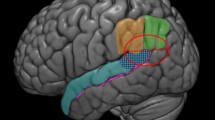Abstract
I outline the early Heidegger's views on mood and emotion, and then relate his central claims to some recent finding in neuropsychology. These findings complement Heidegger in a number of important ways. More specifically, I suggest that, in order to make sense of certain neurological conditions that traditional assumptions concerning the mind are constitutionally incapable of accommodating, something very like Heidegger's account of mood and emotion needs to be adopted as an interpretive framework. I conclude by supporting Heidegger's insistence that the sciences constitute a derivative means of disclosing the world and our place within it, as opposed to an ontologically and epistemologically privileged domain of inquiry.
Similar content being viewed by others
References
Ayer, A. J. (ed). 1959. Logical Positivism. New York: The Free Press.
Bachara, C., Damasio, H., Tranel, D., and Damasio, A. 1997. Deciding advantageously before knowing the advantageous strategy. Science 275: 1293–1295.
Carnap, R. 1959. The elimination of metaphysics through logical analysis of language. In: A. J. Ayer (ed), Logical Positivism. New York: The Free Press.
Damasio, A. 1995. Descartes Error: Emotion, Reason and the Human Brain. London: Picador.
Damasio, A. 1996. The somatic marker hypothesis and the possible functions of the prefrontal cortex. Philosophical Transactions of the Royal Society of London, Series B. Biological Sciences 351: 1413–1420.
Damasio, A. 2000. The Feeling of What Happens: Body, Emotion and the Making of Consciousness. London: Vintage.
Darwin, C. 1872. The Expression of the Emotions in Man and Animals. Reprinted 1998. London: Harper Collins.
De Sousa, R. 1990. The Rationality of Emotion. Cambridge, MA: MIT Press.
Dennett, D. C. 1991. Consciousness Explained. Allen Lane: The Penguin Press.
Dreyfus, H. L. 1991. Being-in-the-world: A Commentary on Heidegger's Being and Time, Division I. Cambridge, MA: MIT Press.
Dreyfus, H. L. and H. Hall (eds). 1992. Heidegger: A Critical Reader. Oxford: Blackwell.
Fell, J. P. 1992. The familiar and the strange: on the limits of praxis in the early Heidegger. In: H. L. Dreyfus and H. Hall (eds), Heidegger: A Critical Reader. Oxford: Blackwell.
Fodor, J. 1975. The Language of Thought. Hassocks, Sussex: Harvester Press.
Gallagher, S. 2000. Philosophical conceptions of the self: implications for cognitive science. Trends in Cognitive Sciences 4: 14–21.
Gazzaniga, M. S. 1994. Natures Mind.London: Penguin.
Griffiths, P. 1997. What Emotions Really Are: The Problem of Psychological Categories. Chicago: Chicago University Press.
Guignon, C. (ed). 1993. The Cambridge Companion to Heidegger. Cambridge: Cambridge University Press.
Harr, M. 1992. Attunement and thinking. In: H. L. Dreyfus and H. Hall (eds), Heidegger: A Critical Reader. Oxford: Blackwell.
Heidegger, M. 1962. Being and Time, trans. J. Macquarrie and E. Robinson. Oxford: Blackwell.
Heidegger, M. 1996. Being and Time, trans. J. Stambaugh. New York: State University of New York Press.
Heidegger, M. 1978. What is metaphysics? In: D. F. Krell (ed), Basic Writings, trans. D. F. Krell. London: Routledge.
Heidegger, M. 1982. Basic Problems of Phenomenology, trans. A. Hofstadter. Bloomington, IN: Indiana University Press.
James, W. 1884. What is an emotion? Mind 9: 188–205.
James, W. 1893. The Principles of Psychology. New York: Holt.
Johnson-Laird, P. and K. Oakley. 1992. Basic emotions, rationality and folk theory. Cognition and Emotion 6: 201–223.
Kockelmans, J. J. 1989. Heideggers “Being and Time”: The Analytic of Dasein as Fundamental Ontology. Washington D.C.: Center for Advanced Research in Phenomenology and University Press of America.
Kusch, M. 1995. Psychologism: A Case Study in the Sociology of Philosophical Knowledge. London: Routledge.
Lyons, W. 1980. Emotion. Cambridge: Cambridge University Press.
Macann, C. (ed). 1992. Martin Heidegger: Critical Assessments, Volume 1. London: Routledge.
McCarthy, J. Narrative Theories of the Self. Unpublished PhD dissertation.
McGlynn, S. M. and D. L. Schachter. 1989. Unawareness of deficits in neuropsychological syndromes. Journal of Clinical and Experimental Neuropsychology 11: 143–205.
Merleau-Ponty, M. 1962. Phenomenology of Perception, trans. C. Smith. London: Routledge.
Olafson, F. A. 1987. Heidegger and the Philosophy of Mind. New Haven/London: Yale University Press.
Petitot, J., Varela, F. J., Pachoud, B., and Roy, J. (eds). 1999. Naturalizing Phenomenology: Issues in Contemporary Phenomenology and Cognitive Science. Stanford: Stanford University Press.
Polt, R. 1999. Heidegger: An Introduction. London: UCL Press.
Ramachandran, V. S. and S. Blakeslee. 1998. Phantoms in the Brain: Human Nature and the Architecture of the Mind. London: Fourth Estate.
Ratcliffe, M. J. (in press). Heidegger, analytic metaphysics and the being of beings. Inquiry: An Interdisciplinary Journal of Philosophy.
Ricoeur, P. 1992. Oneself as Another, trans. K. Blamey. Chicago/London: University of Chicago Press.
Solomon, R. 1977. The Passions. New York: Anchor.
Styron, W. 1991. Darkness Visible. London: Vintage.
Taylor, C. 1993. Engaged agency and the background in Heidegger. In: C. Guignon (ed), The Cambridge Companion to Heidegger. Cambridge: Cambridge University Press.
Thompson, A. E. and M. Swan. 1993. Capgras syndrome presenting with violence following heavy drinking. The British Journal of Psychiatry 162: 692–694.
Young, A. W., Reid, I., Wright, S., and Hellawell, D. J. 1993. Face-processing impairments and the Capgras delusion. The British Journal of Psychiatry 162: 695–698.
Author information
Authors and Affiliations
Rights and permissions
About this article
Cite this article
Ratcliffe, M. Heidegger's attunement and the neuropsychology of emotion. Phenomenology and the Cognitive Sciences 1, 287–312 (2002). https://doi.org/10.1023/A:1021312100964
Issue Date:
DOI: https://doi.org/10.1023/A:1021312100964




